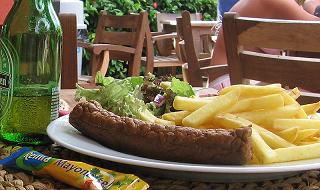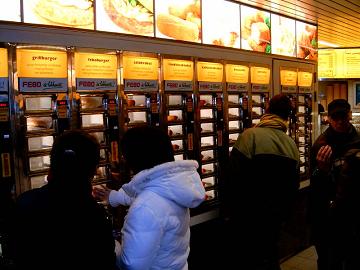Is one of those quirky hipster Amsterdam restaurants, barely half a stop out of Centraal Station, just follow the five or one, specialising in, well, soup. Nice soup, judging from the way S, is slurping it down at the moment. But really, why should I bring soup halfway through town to her when the hospital is supposed to provide food for her, tailored to her exact requirements?
Because it’s crap. Bad enough the visitors restaurant believes reheating microwave precooked meals is the only way to cook and can be sold at prices more expensive than if you had the same meal properly cooked in a proper restaurant. But infinitely worse the food for the patients, as I’ve now experienced both first and secondhand. Three meals a day: breakfast at eight, supper at twelve and dinner at five, with the one hot meal of the day for some stupid reason in the middle of the day, perpetuating an obsolete Dutch custom long since abandoned by anybody sensible.
Supposedly you’re able to chose what you want for any of the meals, but a) the choices are limited and b) you’re lucky to get what you ordered one time out of five. With breakfast and dinner, the choice is between various kinds of dry sliced breads, your choice of cheese (sweaty anyway you slice it) and/or cold mystery meats (dry again) and/or those little cups of hotel jam/hagelslag/butter, perhaps with some form of soup (if you like the one on offer) or snack (usually deepfried, often egg based). With supper, it’s a choice of boiled or mashed potato or variants on it, with some kind of meat (veal is a favourite, or the Dutch equivalent of chicken kiev), gravy and one of three or four kinds of vegetables. Some form of dessert is also on offer. Theoretically there are also vegetarian and restricted diet versions of the menu on offer as well, but we haven’t seen those yet.
And if there’s anything S. needs it’s a restricted diet. She can’t eat eggs, artificial butter, cheese, deep fried stuff, too much fat or protein, certain vegetables and certainly no grapefruit (apparantly a deadly fruit for kidney transplant patients) and yet she keeps getting offered these fat laden, protein rich deep fried foods she can’t eat. it’s as if there’s a fundamental disconnect between the medical care and the food services, with no thought given to integrate the patient’s dietary restrictions into their meal plans.
Which I suspect is a consequence of the hospital having outsourced the food supply. I’m not even sure it’s made on the premises, but whereever it’s made, by the time it gets to you all the hot food is stone cold and the cold food is all lukewarm or melted, if you’re lucky enough to get ice cream (too fat). It all resembles the worst kind of school dinner service, before Jamie Oliver gets to it, lowest common denominator food purely chosen for cost rather than health reasons.
Worse, the portions are too small.

